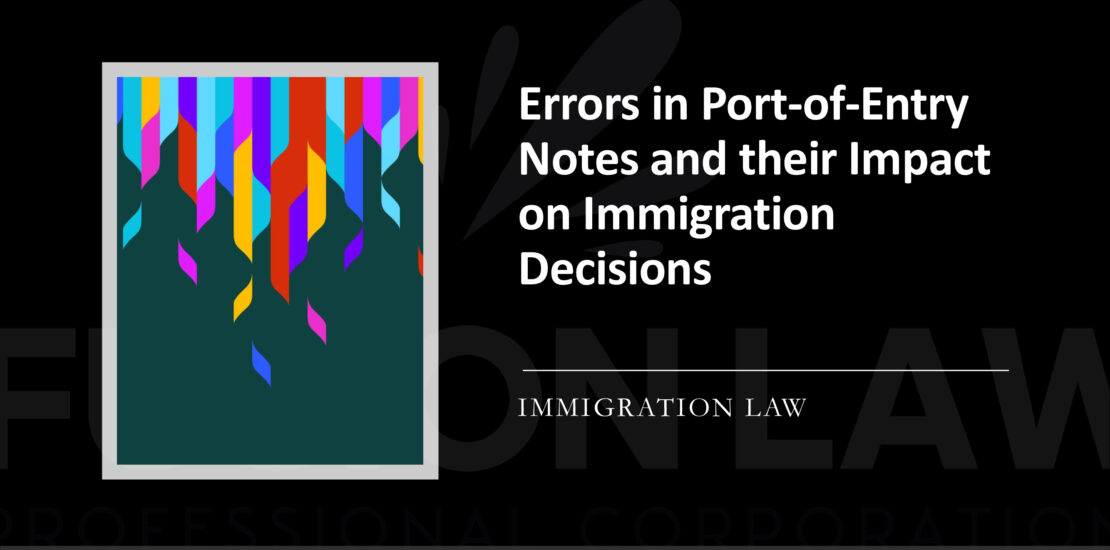𝗘𝗿𝗿𝗼𝗿𝘀 𝗶𝗻 𝗣𝗼𝗿𝘁-𝗼𝗳-𝗘𝗻𝘁𝗿𝘆 𝗡𝗼𝘁𝗲𝘀 𝗮𝗻𝗱 𝗧𝗵𝗲𝗶𝗿 𝗜𝗺𝗽𝗮𝗰𝘁 𝗼𝗻 𝗜𝗺𝗺𝗶𝗴𝗿𝗮𝘁𝗶𝗼𝗻 𝗗𝗲𝗰𝗶𝘀𝗶𝗼𝗻𝘀
- November 30, 2024
- Posted by: Fusion Law
- Category: Immigration

In accordance with the established jurisprudence of the Federal Court of Canada, it is a reviewable error for decision-makers to rely on port-of-entry notes without verifying their accuracy, particularly when other evidence casts doubt upon the reliability of such notes.
The Court has the authority to overturn a decision where reliance has been placed on Canada Border Services Agency (CBSA) port-of-entry notes that are demonstrably erroneous or flawed.
In the case of Gibson v. Canada (Citizenship and Immigration), 2024 FC 1478, the Federal Court reviewed a decision made by a senior immigration officer concerning an application for permanent residence.
The officer had denied the application on the grounds of inadmissibility due to organized criminality under paragraph 37(1)(a) of the Immigration and Refugee Protection Act (IRPA). The Court concluded that the officer’s decision was unreasonable and ordered it to be set aside.
The applicant, a citizen of Barbados, was found inadmissible based on an alleged gang affiliation. The decision was primarily based on port-of-entry notes from a 2010 interview, in which the applicant was purportedly said to have admitted gang membership and criminal activity. However, the applicant denied these claims, asserting that he had never made such an admission and that the officers had misinterpreted his tattoos.
Despite these denials, the officer relied on the 2010 interview notes, which contained discrepancies, including inaccuracies in the description of the applicant’s tattoos that were cited as evidence of gang affiliation.
While the Respondent emphasized multiple recorded instances of the applicant allegedly admitting gang membership and referenced the applicant’s history of providing misleading information to immigration authorities, the Court found that these arguments were insufficient to justify the officer’s reliance on flawed evidence.
The Court determined that the inconsistencies between the applicant’s denials and the original statements were not properly addressed, and the officer did not sufficiently explain the weight given to the statements in light of the evidence undermining their reliability.
The Court found the officer’s decision to be unreasonable, particularly due to the uncritical reliance on the erroneous port-of-entry notes. The applicant’s explanation of the tattoos, which contradicted the officer’s assessment, further raised questions regarding the credibility of the evidence.
The officer’s failure to address the discrepancies and the errors in the port-of-entry notes undermined the reasonableness of the decision. Consequently, the Court set aside the officer’s decision, noting the significant personal consequences for the applicant and his family, including the potential separation from his Canadian spouse and children.
The Court underscored the importance of accurate and reliable evidence in making decisions that have profound implications for an individual’s life and family. This case highlights the Court’s role in ensuring that immigration officers provide well-reasoned justifications, particularly when discrepancies in evidence are identified.
𝘕𝘰𝘵𝘦: 𝘍𝘰𝘳 𝘴𝘱𝘦𝘤𝘪𝘧𝘪𝘤 𝘭𝘦𝘨𝘢𝘭 𝘢𝘥𝘷𝘪𝘤𝘦, 𝘤𝘰𝘯𝘴𝘶𝘭𝘵 𝘢𝘯 𝘢𝘵𝘵𝘰𝘳𝘯𝘦𝘺 𝘢𝘣𝘰𝘶𝘵 𝘺𝘰𝘶𝘳 𝘪𝘯𝘥𝘪𝘷𝘪𝘥𝘶𝘢𝘭 𝘤𝘢𝘴𝘦.



